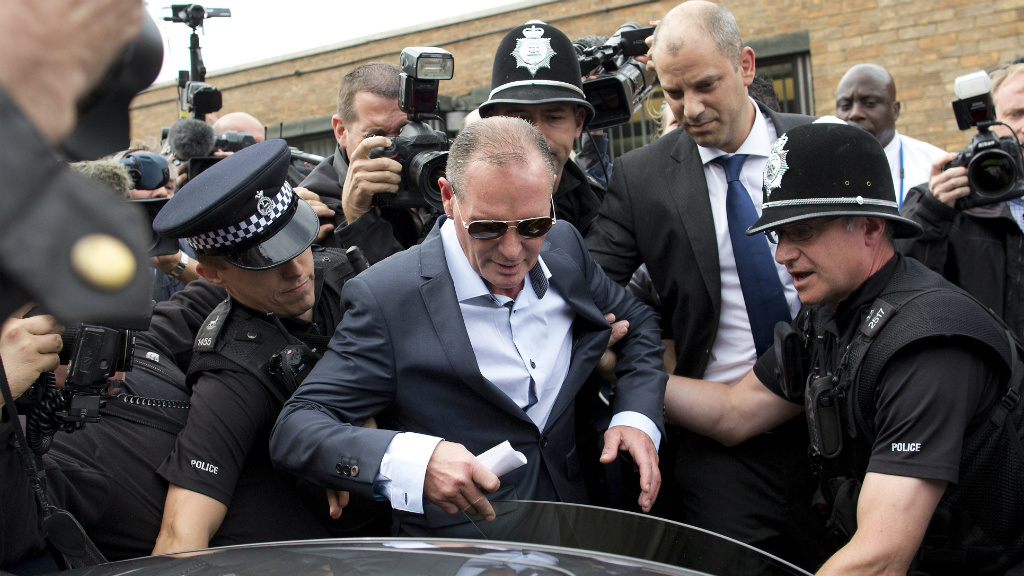Gazza fined £1,000 after Stevenage station assault
Former England football star Paul Gascoigne is fined £1,000 after admitting common assault and drunk and disorderly charges linked to an incident at Stevenage railway station.

Gascoigne, who has battled alcoholism for many years, was fined £600 for one charge of assault and £400 for a drunk and disorderly charge following an appearance at Stevenage Magistrates Court.
The former Newcastle United and Tottenham midfielder, who lives in Gateshead, Tyne and Wear, was arrested after officers were called to Stevenage rail station in Hertfordshire at around 10.30pm on 4 July.
Security guard Jack Sherrington noticed that Gascoigne was staggering towards the railway tracks. Staff tried to help him by putting him in a wheelchair, but he became abusive to Mr Sherrington and used the “c-word” repeatedly, Elaine McMillan, prosecuting, told Stevenage Magistrates’ Court.
Ms McMillan said Gascoigne grabbed hold of Mr Sherrington in the neck area – an assault which lasted a few seconds. Mr Sherrington, who was working for a company contracted to First Capital Connect, was uninjured.
Alcoholism
The court heard that Gascoigne, of Gateshead, had been in Newcastle visiting his father, who has a heart condition. He was travelling from Newcastle to London King’s Cross but got off at Stevenage.
The court heard that Gascoigne’s ex-wife, Sheryl, and children were called to the station and, in her sentencing, chair of the bench Carolyn Marsh pointed out that his 17-year-old son was “distressed”.
The 46-year-old, who received treatment for alcoholism in an American clinic earlier this year, was originally charged with two counts of assault, one involving his ex-wife, but that charge was dropped
As well as the fine, he was ordered to pay £100 in compensation to Mr Sherrington, court costs of £85 and a victim surcharge of £60.
Gascoigne, clutching a packet of cigarettes and wearing a dark suit, pale blue shirt, beige loafers with no socks and sunglasses, was greeted outside Stevenage Magistrates’ Court by a media scrum.
The packed courtroom looked on as Gascoigne, who also had spells at Glasgow Rangers and Lazio, listened to the charges being read to him and entered guilty pleas to assault and drunk and disorderly in a public place.
Stress
Gascoigne clutched his mobile phone throughout the court appearance.
His lawyer, Gavin Harris, said he had only consumed a small amount of alcohol due to a “combination of stress caused by worry for his father and acute pain from a hip operation six weeks previously”.
Mr Harris said that because Gascoigne had not drunk alcohol for a significant period of time, the effects were stronger than would have otherwise been the case.
The court also heard that Gascoigne was receiving “one-to-one” treatment for his alcoholism, which is continuing.
With his sunglasses back on, Gascoigne left the court and was driven away in a grey Porsche.
In a statement outside court, Mr Harris said: “Mr Gascoigne has asked me to say a few words on his behalf. He wants to publicly apologise for his actions that evening.
“He now wishes to be left alone to carry on with his recovery.”
‘Not tolerated’
A First Capital Connect spokesman said: “Violence towards any staff either in our direct employ or, as in this case, through a third party should not be tolerated and we welcome the court’s decision.”
First thrust into the national consciousness after a number of brilliant performances at the 1990 World Cup in Italy, Paul Gascoigne quickly became a household name.
Known as “Gazza”, his career included appearances for Newcastle United, Tottenham Hotspur, Lazio, and Rangers and he became loved by fans as a talented joker.
But off the pitch he struggled with alcoholism and experienced problems with his mental health. He was twice sectioned in the space of six months in 2008 and admitted in his autobiography to headbutting his then wife Sheryl and throwing her to the floor.
Other high profile incidents included being sacked from managing Kettering Town FC in 2005 after he was accused of being drunk at games and appearing at the scene of the stand-off between the police and fugitive gunman Raoul Moat in 2010.